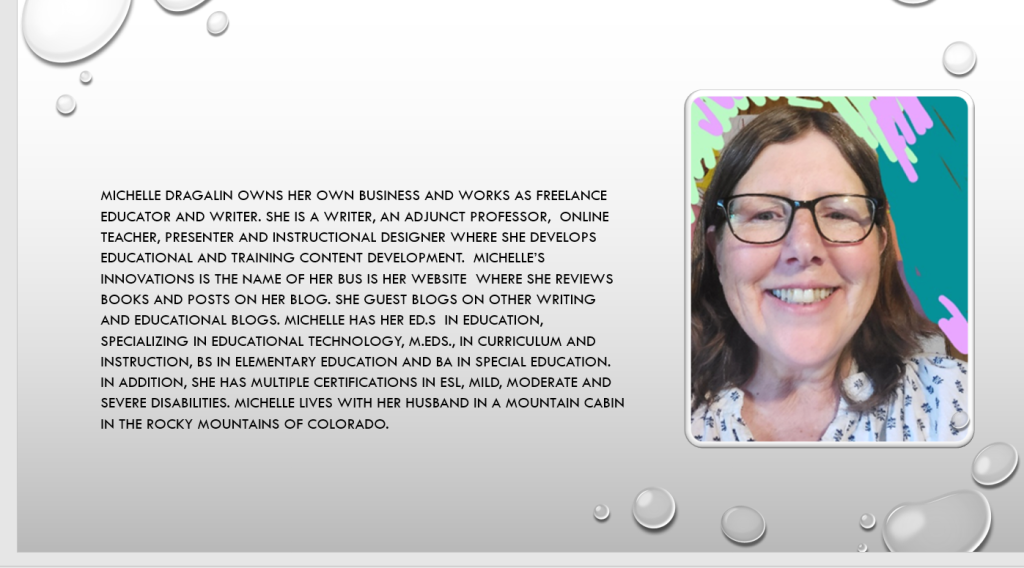True Crime — Michelle Dragalin
Today I’m happy to welcome Michelle Dragalin as she shares about her passion for true crime books.
Discovery Channel Investigative Discovery is my favorite channel. I have the app for Discovery Channel Plus. My husband has stated that if he dies, they really need to look at me. The jokes on him though, because the spouse is always the first suspect and must be cleared first. Aside from the fact that this genre is one of my favorite types of books to read, I also enjoy watching it on TV, and writing about True Crime. One lesson I have learned from all these shows and books is that the right person will eventually get caught. (Please do not send me quotes or belief to the contrary)
The definition of a True Crime is about an actual crime that is committed. According to definition.net, “is a non-fiction literary and film genre in which the author examines an actual crime and details of a real crime. (definitions.net/definition/TRUE+CRIME).” Historical True Crime genre is another subdivision that people find extremely interesting especially if it is related to murder.
Quite a few True Crime books are written about murder, especially serial killings. After that the topics include kidnapping burglary, forgery, and drug related crimes. If you look at the Top 10 True Crime best sellers list of 2021 there are seven books about murder, one about child abuse and one about Heists and Robberies.
Writing in the true crime genre is a little more complex than people would believe. True crime is multifaceted because the writer must become deeply knowledgeable about the genre, the writing process, the crime, and the people involved in the crime. It is important that writer must remember the following:
- Never forget that you are writing about real people
- Sort out why this is the story you want to tell because the answer will drive the narrative.
- Remember tht the victims are frequently women
- The themes of the true crime stories have a real bearing on the present day.
Once you have established these points in your mind. It is a clever idea to write them down. The
next sections of writing true crime novels involve an extreme amount of in-depth research that includes:
- If it is present day, you should attend the trial
- Learn what you can about the evidence
- Learn what you can about the people directly involved (get an interview release and Photograph release.)
- Courtroom Evidence
- Fees can be added for copies of evidence, the transcript plus your time.
- Police Departments:
- MOST records can be obtained through the Freedom of Information Act. (FOIA)
- FOIA may give you speedy access, but the department does not have to create the forms for you, conduct research, analyze data or answer questions.
- Not all information will be made public and if the case is considered open you will not have the right to any of the information even through FOIA.
- FOIA
- There are samples of FOIA request forms online
- The FOIA forms are lengthy
- They require detailed accounting of what you want, what you will use it for and why you want the information.
- Do not be surprised to receive a paper where words, sentences or pictures are blackened.
- There are samples of FOIA request forms online
- It is an innovative idea to have a lawyer versed in publication to read the manuscript, so you will not be sued.
- the same criteria apply to true crime articles and blogs as well.
I started writing True Crime because I have served on more than one jury. My husband is a retired sailor and I have always registered to vote at our new locations. Information from juries is a section that is lacking in most true crime stories. People think that they understand what the jurors are going through and do not understand why a defendant is acquitted, receive a reduced sentence, result in a mistrial or are found guilty.
It upsets me when the media or writer think that they understand what is going on in the jury box when they do not interview them. Any evidence or piece of testimony must be approved by the judge and the lawyers for each side before it can be given to the jury, even when they request it! The bailiff makes sure that the jury’s discussion is not about the trial, or anything remotely connected to the case. I learned about deer hunting during a burglary case because that is all we had in common and what we could safely discuss while we waited for the judge to rule on something.
The True Crime genre makes for fascinating reading, watching, or writing, but always remember that there was a true victim, and rarely is there a hero in the story.

Posted on December 22, 2021, in Uncategorized. Bookmark the permalink. Comments Off on True Crime — Michelle Dragalin.